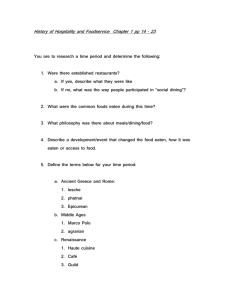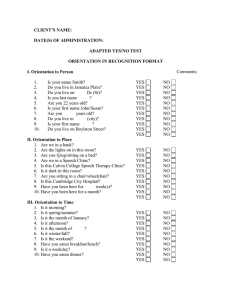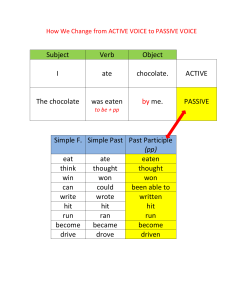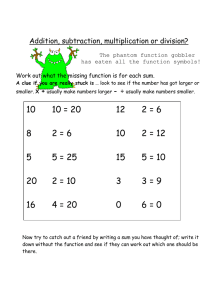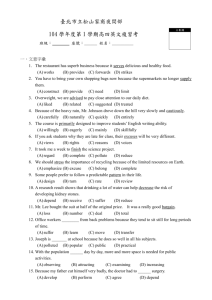Present Perfect Tense: English Grammar Presentation
advertisement
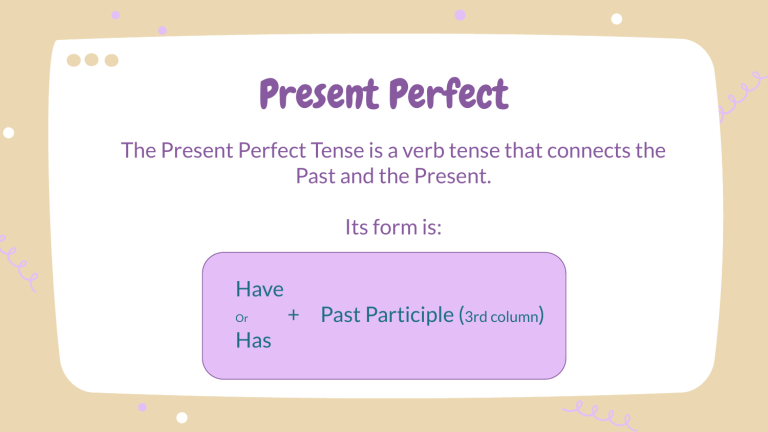
Present Perfect The Present Perfect Tense is a verb tense that connects the Past and the Present. Its form is: Have Or Has + Past Participle (3rd column) Present Perfect AFFIRMATIVE I You He She It We You They have eaten have eaten has eaten has eaten has eaten have eaten have eaten have eaten Present Perfect NEGATIVE I You He She It We You They haven’t eaten haven’t eaten hasn’t eaten hasn’t eaten hasn’t eaten haven’t eaten haven’t eaten haven’t eaten Present Perfect INTERROGATIVE Have Have Has Has Has Have Have Have I You He She It We You They eaten? eaten? eaten? eaten? eaten? eaten? eaten? eaten? We use the present perfect: ✔ for actions which happened at an unstated indefinite time in the past. The exact time is not important. They have bought a new house. (When did they buy it? We don’t know when; the time is not mentioned.) I have been to France twice. (When? We don’t know.) Present Perfect The Taylors have bought a new boat. (The exact time is unimportant or unknown. What is important is the fact that they now own a boat.) We use the present perfect: ✔ for actions which started in the past and are still continuing in the present. I have known Mary for ten years. (We met ten years ago and we still know each other.) I have worked here for four years. (I started working here four years ago and I still work here.) Present Perfect They have been friends for twenty years. (They met each other 20 years ago and they are still friends) We use the present perfect: ✔ for actions which have recently finished and their results are visible in the present. Tom has just painted the fence. (He has just finished painting. The paint on the fence is still wet.) Look at her. She is sad. She has failed the exam. (We can see in her face that she is sad.) Present Perfect: She has picked a lot of apples. (The apples are in the basket so the action is finished.) Present Perfect: Already and just are used in statements and go between the verb have and past participle. They have already packed their suitcases. I’ve just phoned him. Yet is used in questions and negations and goes at the end of the sentence. Have you posted the letters yet? He hasn’t written to me yet. Have you done your homework yet? I haven’t done my homework yet. Present Perfect: Ever is used in questions and goes between the verb have and the past participle. Have you ever played squash? Have you ever travelled abroad? Never is used to make a negative statement and goes between the verb have and the past participle. I have never played squash. I have never travelled abroad. Present Perfect: Say the past participles of the verbs: see cut work leave feed bring swim buy drink go seen .................... cut .................... worked .................... left .................... fed .................... brought .................... swum .................... bought .................... drunk .................... gone .................... catch read arrive make give sing teach ring do eat caught .................... read .................... arrived .................... made .................... given .................... sung .................... taught .................... rung .................... done .................... eaten .................... Present Perfect: Complete the blanks with the Present Perfect. 1. I ...................... (see) that film before. 2. We ...................... (read) three English books in class. 3. My mother ..................... (be) to London twice this year. 4. John ........................... (borrow) four CDs from me. 5. The children ............................ (eat) breakfast. 6. You ......................... (drink) all the coffee. 7. Be quiet! The film ......................... (start). 8. My parents ....................... (have) this house since 1950. Present Perfect: Complete the blanks with the Present Perfect. have seen 1. I ...................... (see) that film before. have read (read) three English books in class. 2. We ...................... has been (be) to London twice this year. 3. My mother ..................... has borrowed (borrow) four CDs from me. 4. John ........................... have eaten 5. The children ............................ (eat) breakfast. have drunk (drink) all the coffee. 6. You ......................... has started 7. Be quiet! The film ......................... (start). have had 8. My parents ....................... (have) this house since 1950. Source https://www.slideshare.net/arzugumus/present-perfect-present ation-698981 (adapted) September 27th, 2020.
